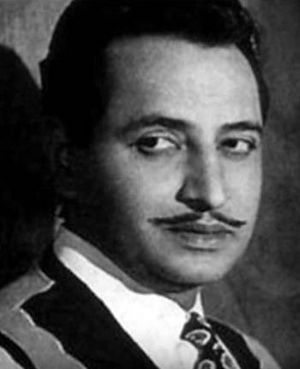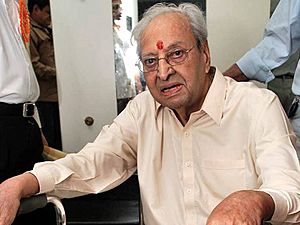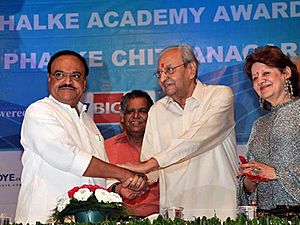Pran (actor) facts for kids
Quick facts for kids
Pran Krishan Sikand Ahluwalia
|
|
|---|---|

Pran in a 1954 publicity photo
|
|
| Born |
Pran Krishan Sikand Ahluwalia
12 February 1920 |
| Died | 12 July 2013 (aged 93) Mumbai, Maharashtra, India
|
| Nationality | Indian |
| Other names | Villain of the Millennium |
| Occupation | Actor |
| Years active | 1940–2007 |
| Spouse(s) |
Shukla Sikand Ahluwalia
(m. 1945) |
| Children | 3 (including Sunil Sikand Ahluwalia) |
| Awards | 3 Filmfare Awards for Best Supporting Actor |
| Honours | Padma Bhushan (2001) Dadasaheb Phalke Award (2013) |
Pran Krishan Sikand Ahluwalia (born February 12, 1920 – died July 12, 2013), known simply as Pran, was a famous Indian actor. He is remembered as one of the greatest villains and character actors in Bollywood (Hindi cinema) from the 1940s to the 1990s. He was highly respected and one of the highest-paid actors of his time.
Pran started his career playing hero roles from 1940 to 1947. He then became famous for playing negative characters, or villains, from 1942 to 1991. Later, from 1967 to 2007, he took on supporting and character roles. The 1950s and 1960s were his peak years as a villain. His acting was so convincing that people in India sometimes avoided naming their children "Pran" during those years!
He appeared in over 362 films during his long career. Some of his well-known roles were in movies like Madhumati (1958), Jis Desh Mein Ganga Behti Hai (1960), Upkar (1967), Zanjeer (1973), and Don (1978).
Pran received many awards for his work. He won the Filmfare Award for Best Supporting Actor three times. In 2000, he was named the "Villain of the Millennium" by Stardust. The Indian government honored him with the Padma Bhushan in 2001 and the Dadasaheb Phalke Award in 2013. This is the highest award for film artists in India. In 2010, CNN listed him among the Top 25 Asian actors of all time.
Pran passed away on July 12, 2013, at the age of 93, after a long illness in Mumbai.
Contents
Early Life and School
Pran was born on February 12, 1920, in Old Delhi, India. His family was Punjabi Hindu. His father, Kewal Krishan Sikand Ahluwalia, was a civil engineer. His mother was Rameshwari Ahluwalia. Pran was one of seven children, with four brothers and three sisters.
Pran was very good at school, especially in math. Because his father's job required moving often, Pran studied in many different cities. These included Dehradun, Lahore, and Meerut. He finished his schooling in Rampur. After that, he started training to become a professional photographer in Delhi. He even played the role of Sita in a local play called "Ramlila" in Shimla.
Starting His Acting Career
Pran got his first acting role by chance in 1940. He met a writer named Wali Mohammad Wali in Lahore. This led to him being cast in the Punjabi film Yamla Jat (1940). He then had small roles in Chaudhary and Khajanchi in 1941.
His first Hindi film was Khandaan (1942). In this movie, he played a romantic hero. He acted opposite Noor Jehan, who was a child artist in his first film.
Moving to Bombay
Pran had acted in 22 films in Lahore before India was divided in 1947. After the Partition of India, he moved to Bombay (now Mumbai). For a few months, he looked for acting jobs while working other small jobs.
In 1948, he got a role in the film Ziddi. This movie starred Dev Anand and Kamini Kaushal. Ziddi helped launch Pran's career in Bombay. It also became a big break for Dev Anand. Soon after, Pran signed three more films. By 1950, he was known as a top villain in Hindi cinema.
Becoming a Star Villain
Pran's early successful films as a villain were Ziddi and Bari Behan (1949). In Bari Behan, he first showed his famous trick of blowing smoke rings. He often played the main villain in films with big stars like Dilip Kumar, Dev Anand, and Raj Kapoor in the 1950s and 1960s.
Directors like Bimal Roy often cast him. In the 1960s, directors like Shakti Samanta also frequently worked with him. Even in the 1970s, new directors wanted Pran in their films. He was the highest-paid supporting actor from 1968 to 1982.
Pran's villain roles were especially praised in films with Dilip Kumar, such as Madhumati (1958) and Ram Aur Shyam (1967). He also starred in films with Dev Anand like Jab Pyar Kisi Se Hota Hai (1961) and with Raj Kapoor in Jis Desh Mein Ganga Behti Hai (1960). He even played the lead hero in successful films like Pilpili Saheb (1954) and Halaku (1956).
Pran played many different types of roles. He was a pirate in Sindbad the Sailor (1952), and appeared in action films, historical dramas, and romantic comedies. Even in his 40s, he played important roles alongside younger heroes like Shammi Kapoor and Dharmendra. From the 1950s to the early 1970s, Pran became very famous for his villain roles. From 1964, he also added a funny side to his negative characters in films like Pooja Ke Phool.
He also acted in comedy films with Kishore Kumar and Mehmood Ali.
Changing Roles: From Villain to Character Actor
In the late 1960s, Pran started playing more sympathetic roles. In Manoj Kumar's film Upkar (1967), he played Malang Chacha, a war hero. The popular song "Kasme Waade Pyaar Wafaa" was filmed on him. For this role, he won his first Filmfare Award. Manoj Kumar continued to cast him in important roles in films like Purab Aur Paschim (1970).
From 1967, he also acted in Bengali films. His new roles helped change his image from just a villain to a versatile character actor. After 1969, he even got lead roles in films like Nanha Farishta (1969) and Dharma (1973).
Working with Other Stars
Pran and Ashok Kumar were very close friends and worked together in 27 films. These included Victoria No. 203 (1972). Songs filmed on Pran, like "Hum Bolega To Bologe Ke Bolta Hai" from Kasauti (1974), became very popular.
From 1969 to 1982, Pran was one of the highest-paid actors in Bollywood. In 1973, he suggested Amitabh Bachchan for the role of Vijay in Zanjeer. This role had been offered to other actors before. Pran's role as Sher Khan in Zanjeer, with his red wig and beard, was greatly loved. Pran acted with Amitabh Bachchan in about 14 films, including Zanjeer, Don, and Amar Akbar Anthony.
Pran sometimes still played villain roles from 1971 to 1992. He also had double roles in some films like Khoon Ka Rishta.
Later Years and Retirement
In 1991, Pran produced his only film, Lakshmanrekha, where he also acted.
In 1998, at 78 years old, Pran had a heart attack. After this, he started turning down film offers due to health issues. However, in the 1990s, Amitabh Bachchan asked Pran to act in his home productions, Tere Mere Sapne (1996) and Mrityudata (1997). Pran agreed to help Bachchan during a difficult time in his career. In these films, his roles were adjusted to fit his health. After 2000, he made only a few guest appearances.
Pran's Personal Life
Pran married Shukla Ahluwalia in 1945. They had two sons, Arvind Ahluwalia and Sunil Sikand Ahluwalia, and one daughter, Pinky Ahluwalia.
Illness and Death
Pran was treated at Lilavati Hospital in Mumbai and passed away on July 12, 2013. He had been in the hospital several times in the months before his death due to his health. His death was noted by many important people. India's Prime Minister Manmohan Singh called him "an icon." Actor Amitabh Bachchan said Pran was a "magnificent pillar" of the film industry.
His Legacy and Impact
Pran had a career that lasted six decades in Hindi cinema. He is one of the most celebrated actors in the industry. His acting was so powerful that people sometimes avoided naming their children "Pran" because of his negative roles. In the film industry, he was often called "Pran Sahab." His favorite line, "Barkhurdaar," became very popular.
In 2000, a film journalist named Bunny Reuben wrote a book about Pran called "...and Pran." The title comes from the fact that in most of Pran's movies, his name was listed last in the credits, usually with the words "...and Pran."
In 2012, he placed his handprint for "Legend's Walk" in Bandra, Mumbai.
Filmography
Source: Official website: https://www.pransikand.com/filamcareer.html#. See also articles on individual films.
Awards and Honors
Pran received many awards for his acting, especially for his villain roles. He won three Filmfare Awards for Best Supporting Actor. However, in 1973, when he won for his role in Be-Imaan, he refused the award. He felt that the Best Music Director award should have gone to Ghulam Mohammed for Pakeezah, not to the music directors of Be-imaan. He also won three Bengal Film Journalists' Association Awards.
For his huge contributions to Indian cinema, Pran received several Lifetime Achievement awards. These included awards from Filmfare, Star Screen Awards, and Zee Cine Awards. In 2001, the Government of India gave him the Padma Bhushan, which is India's third-highest civilian award.
In April 2013, he was announced as the winner of the Dadasaheb Phalke Award. This is the most important award in Indian cinema, given by the Government of India. He could not attend the award ceremony due to his health. So, the Information and Broadcasting minister presented the award to him at his home in Mumbai. Many celebrities congratulated him.
Major Awards
Civilian Award
- 2001 – Padma Bhushan, India's third highest civilian award from the Government of India.
National Film Awards
- 2013 – Dadasaheb Phalke Award, India's highest national award for cinema artists, presented by Government of India, for lifetime achievement.
Filmfare Awards
- 1967 – Best Supporting Actor for Upkar
- 1969 – Best Supporting Actor for Aansoo Ban Gaye Phool
- 1972 – Best Supporting Actor for Be-Imaan
- 1997 – Special Award
Bengal Film Journalists' Association Awards
- 1961 – Best Actor in a Supporting Role: Jis Desh Men Ganga Behti Hai
- 1966 – Best Actor in a Supporting Role: Shaheed
- 1973 – Best Actor in a Supporting Role: Zanjeer
Other Awards and Recognitions
- 1972–73 – Chitrlok Cine Circle Ahmedabad: "Best Character Artiste Award".
- 1975–76 – Bombay Film Award: Most Versatile Actor.
- 1977–78 – Bombay Film Award: Most Versatile Actor.
- 1978 – North Bombay Jaycees: Best Character Actor.
- 1984 – "Extra Ordinary Special Award as Wizard of Acting" by Bombay Film Award.
- 1984 – Filmgoers Award: Reigning "Abhinay Samrat".
- 1985 – Kala Bhushan Award presented by Punjabi Kala Sangam.
- 1987 – North Bombay Jaycees: Outstanding Performance of Decade.
- "Viyayshree Award" presented for enriching Human Life and Outstanding Attainments India Int. Friendship Society).
- "Ars Gratia Artis" for excellence in emotive Art.
- 1990 – Kala Rattan Award presented by Punjabi Kal Sangam for 50 glorious Years.
- 1990 – Punjab Association: an Award for 50 years in the Industry.
- 1990 – Southall Lion's Club London: "In recognition of Invaluable Services to Charity at the Celebration of Golden Jubilee of his services to the Film Industry.
- 1991 – Cinegoers Award: "Abhinay Samrat Golden Jubilee Award".
- 1992 – Outstanding contribution to Indian Film Industry, Indian Motion Pictures Producers' Association.
- 2000 – Screen Lifetime Achievement Award
- 2000 – Zee Cine Award for Lifetime Achievement
- 2000 – "Villain of the Millennium" by the Stardust Awards.
- 2004 – Lifetime Achievement Award instituted by the Maharashtra Government.
See also
 In Spanish: Pran para niños
In Spanish: Pran para niños
 | Janet Taylor Pickett |
 | Synthia Saint James |
 | Howardena Pindell |
 | Faith Ringgold |



